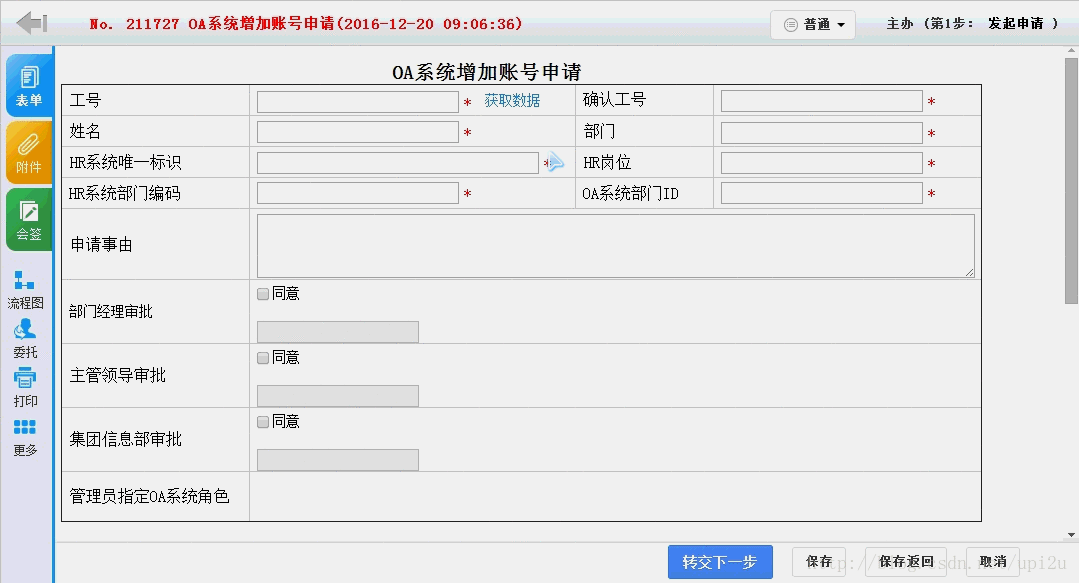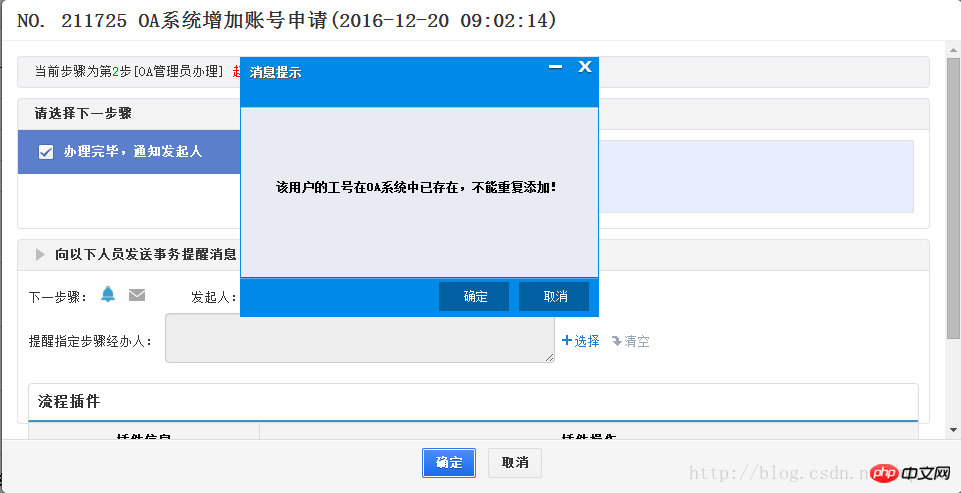 Web Front-end
Web Front-end
 JS Tutorial
JS Tutorial
 How to use Ajax to add OA accounts based on human resources system data
How to use Ajax to add OA accounts based on human resources system data
How to use Ajax to add OA accounts based on human resources system data
This time I will bring you the method of using Ajax to add OA accounts based on human resources system data, and the method of using Ajax to add OA accounts based on human resources system data. What are the precautions?, here is the actual combat Let’s take a look at the case.
The program developed by Xiaofeiyu this time mainly solves the problem that the account added by a subsidiary company in the human resources system cannot be approved immediately. After approval through this process, the plug-in can automatically add OA accounts in the background, and the adding mechanism is consistent with hr is the same as OA system synchronization.
Only add operations, no modification or deletion operations. The automatic data synchronization development of the two systems has been carried out originally, so this development is a supplementary content, and only an application idea and discussion of the development process are provided here.
When the front-end initiator fills in the assigned job number in the HR system when applying, other relevant data can be queried accordingly. In order to avoid modifying the work number after finding the data, a confirmation work number input box is added. Other information is automatically obtained by Ajax in read-only form. In this way, errors caused by completely human input of data can be avoided by obtaining data from another system.

After the approval process is completed, it will be transferred to the OA administrator. The administrator will create an account in the background when making the next transfer. If there are no errors, it will prompt that the creation is successful. , it will also prompt if there is an error.

The hr system is Hongjing’s human resources system, and the database is SQL Server2008, so this development also needs to connect to the sqlserver database.
The main code of the system:
$query="select * from t_hr_view where c01u7='" .$gonghao. "'";
$cursor=sqlsrv_query($conn,$query);
if($row=sqlsrv_fetch_array($cursor,SQLSRV_FETCH_ASSOC)){
$hr_dept_id=$row["E0122_0"];
$hr_dept_name=$row["e0122"];
$OA=$row["OA"];
$hr_name=$row["A0101"];
$hr_gangwei=$row["e01a1"];
$hr_gonghao=$row["c01u7"];
$hr_unique_id=$row["unique_id"];
if($OA==1 or $OA==2){
$query2="select * from user where hr_unique_id='$hr_unique_id' limit 1";
$cursor2=exequery(TD::conn(),$query2);
$num=mysql_num_rows($cursor2);
if($num==0 and $hr_gonghao!=""){
//新增用户
$DEPT_ID="0";
$new_flag=1;
$query4="select DEPT_ID from department where hr_dept_id='$hr_dept_id' limit 1";
$cursor4=exequery(TD::conn(),$query4);
if($row4=mysql_fetch_row($cursor4)){
$DEPT_ID=$row4[0];
}
if(in_array($hr_dept_name, $neitui_dept_arr)){
$DEPT_ID="0";
}
/****查询byname有没有重复的**/
$query5="select * from user where BYNAME='$hr_gonghao' limit 1";
$cursor5=exequery(TD::conn(),$query5);
$num5=mysql_num_rows($cursor5);
//$num5=1;//测试失败
if($num5==1){
$new_flag=-1;
}
/******/
if($new_flag==1){ //允许新增用户
$has_user_id_str = '';
$queryn = 'SELECT UID,USER_ID FROM user';
$cursorn = exequery(TD::conn(), $queryn);
while ($rown = mysql_fetch_array($cursorn)) {
$has_user_id_str .= $rown['USER_ID'] . ',';
}
$USER_ID = get_user_id($has_user_id_str);
$BYNAME=$hr_gonghao; //登录名为工号
$BYNAME = trim($BYNAME);
$USER_NAME=$hr_name;
$USER_NAME = trim($USER_NAME);
$BYNAME = trim($BYNAME);
$UID=add_user_new($ARRAY);
if($UID!=""){
$USER_ID=$UID;
$query3 = "insert into USER_EXT(UID,USER_ID,USE_POP3,EMAIL_CAPACITY,FOLDER_CAPACITY,WEBMAIL_CAPACITY,WEBMAIL_NUM,DUTY_TYPE) values('$UID','$USER_ID','0','500','500','0','0','1')";
exequery(TD::conn(),$query3);
}
}
}
}
}I believe you have mastered the method after reading the case in this article. For more exciting information, please pay attention to other related articles on the php Chinese website!
Recommended reading:
Ajax implementation of the steps to load the progress bar
Use AJAX to asynchronously verify whether the user name is exist
The above is the detailed content of How to use Ajax to add OA accounts based on human resources system data. For more information, please follow other related articles on the PHP Chinese website!

Hot AI Tools

Undresser.AI Undress
AI-powered app for creating realistic nude photos

AI Clothes Remover
Online AI tool for removing clothes from photos.

Undress AI Tool
Undress images for free

Clothoff.io
AI clothes remover

Video Face Swap
Swap faces in any video effortlessly with our completely free AI face swap tool!

Hot Article

Hot Tools

Notepad++7.3.1
Easy-to-use and free code editor

SublimeText3 Chinese version
Chinese version, very easy to use

Zend Studio 13.0.1
Powerful PHP integrated development environment

Dreamweaver CS6
Visual web development tools

SublimeText3 Mac version
God-level code editing software (SublimeText3)

Hot Topics
 How to solve the 403 error encountered by jQuery AJAX request
Feb 20, 2024 am 10:07 AM
How to solve the 403 error encountered by jQuery AJAX request
Feb 20, 2024 am 10:07 AM
Title: Methods and code examples to resolve 403 errors in jQuery AJAX requests. The 403 error refers to a request that the server prohibits access to a resource. This error usually occurs because the request lacks permissions or is rejected by the server. When making jQueryAJAX requests, you sometimes encounter this situation. This article will introduce how to solve this problem and provide code examples. Solution: Check permissions: First ensure that the requested URL address is correct and verify that you have sufficient permissions to access the resource.
 How to solve jQuery AJAX request 403 error
Feb 19, 2024 pm 05:55 PM
How to solve jQuery AJAX request 403 error
Feb 19, 2024 pm 05:55 PM
jQuery is a popular JavaScript library used to simplify client-side development. AJAX is a technology that sends asynchronous requests and interacts with the server without reloading the entire web page. However, when using jQuery to make AJAX requests, you sometimes encounter 403 errors. 403 errors are usually server-denied access errors, possibly due to security policy or permission issues. In this article, we will discuss how to resolve jQueryAJAX request encountering 403 error
 PHP and Ajax: Building an autocomplete suggestion engine
Jun 02, 2024 pm 08:39 PM
PHP and Ajax: Building an autocomplete suggestion engine
Jun 02, 2024 pm 08:39 PM
Build an autocomplete suggestion engine using PHP and Ajax: Server-side script: handles Ajax requests and returns suggestions (autocomplete.php). Client script: Send Ajax request and display suggestions (autocomplete.js). Practical case: Include script in HTML page and specify search-input element identifier.
 How to solve the problem of jQuery AJAX error 403?
Feb 23, 2024 pm 04:27 PM
How to solve the problem of jQuery AJAX error 403?
Feb 23, 2024 pm 04:27 PM
How to solve the problem of jQueryAJAX error 403? When developing web applications, jQuery is often used to send asynchronous requests. However, sometimes you may encounter error code 403 when using jQueryAJAX, indicating that access is forbidden by the server. This is usually caused by server-side security settings, but there are ways to work around it. This article will introduce how to solve the problem of jQueryAJAX error 403 and provide specific code examples. 1. to make
 How to get variables from PHP method using Ajax?
Mar 09, 2024 pm 05:36 PM
How to get variables from PHP method using Ajax?
Mar 09, 2024 pm 05:36 PM
Using Ajax to obtain variables from PHP methods is a common scenario in web development. Through Ajax, the page can be dynamically obtained without refreshing the data. In this article, we will introduce how to use Ajax to get variables from PHP methods, and provide specific code examples. First, we need to write a PHP file to handle the Ajax request and return the required variables. Here is sample code for a simple PHP file getData.php:
 PHP vs. Ajax: Solutions for creating dynamically loaded content
Jun 06, 2024 pm 01:12 PM
PHP vs. Ajax: Solutions for creating dynamically loaded content
Jun 06, 2024 pm 01:12 PM
Ajax (Asynchronous JavaScript and XML) allows adding dynamic content without reloading the page. Using PHP and Ajax, you can dynamically load a product list: HTML creates a page with a container element, and the Ajax request adds the data to that element after loading it. JavaScript uses Ajax to send a request to the server through XMLHttpRequest to obtain product data in JSON format from the server. PHP uses MySQL to query product data from the database and encode it into JSON format. JavaScript parses the JSON data and displays it in the page container. Clicking the button triggers an Ajax request to load the product list.
 PHP and Ajax: Ways to Improve Ajax Security
Jun 01, 2024 am 09:34 AM
PHP and Ajax: Ways to Improve Ajax Security
Jun 01, 2024 am 09:34 AM
In order to improve Ajax security, there are several methods: CSRF protection: generate a token and send it to the client, add it to the server side in the request for verification. XSS protection: Use htmlspecialchars() to filter input to prevent malicious script injection. Content-Security-Policy header: Restrict the loading of malicious resources and specify the sources from which scripts and style sheets are allowed to be loaded. Validate server-side input: Validate input received from Ajax requests to prevent attackers from exploiting input vulnerabilities. Use secure Ajax libraries: Take advantage of automatic CSRF protection modules provided by libraries such as jQuery.
 What are the ajax versions?
Nov 22, 2023 pm 02:00 PM
What are the ajax versions?
Nov 22, 2023 pm 02:00 PM
Ajax is not a specific version, but a technology that uses a collection of technologies to asynchronously load and update web page content. Ajax does not have a specific version number, but there are some variations or extensions of ajax: 1. jQuery AJAX; 2. Axios; 3. Fetch API; 4. JSONP; 5. XMLHttpRequest Level 2; 6. WebSockets; 7. Server-Sent Events; 8, GraphQL, etc.





